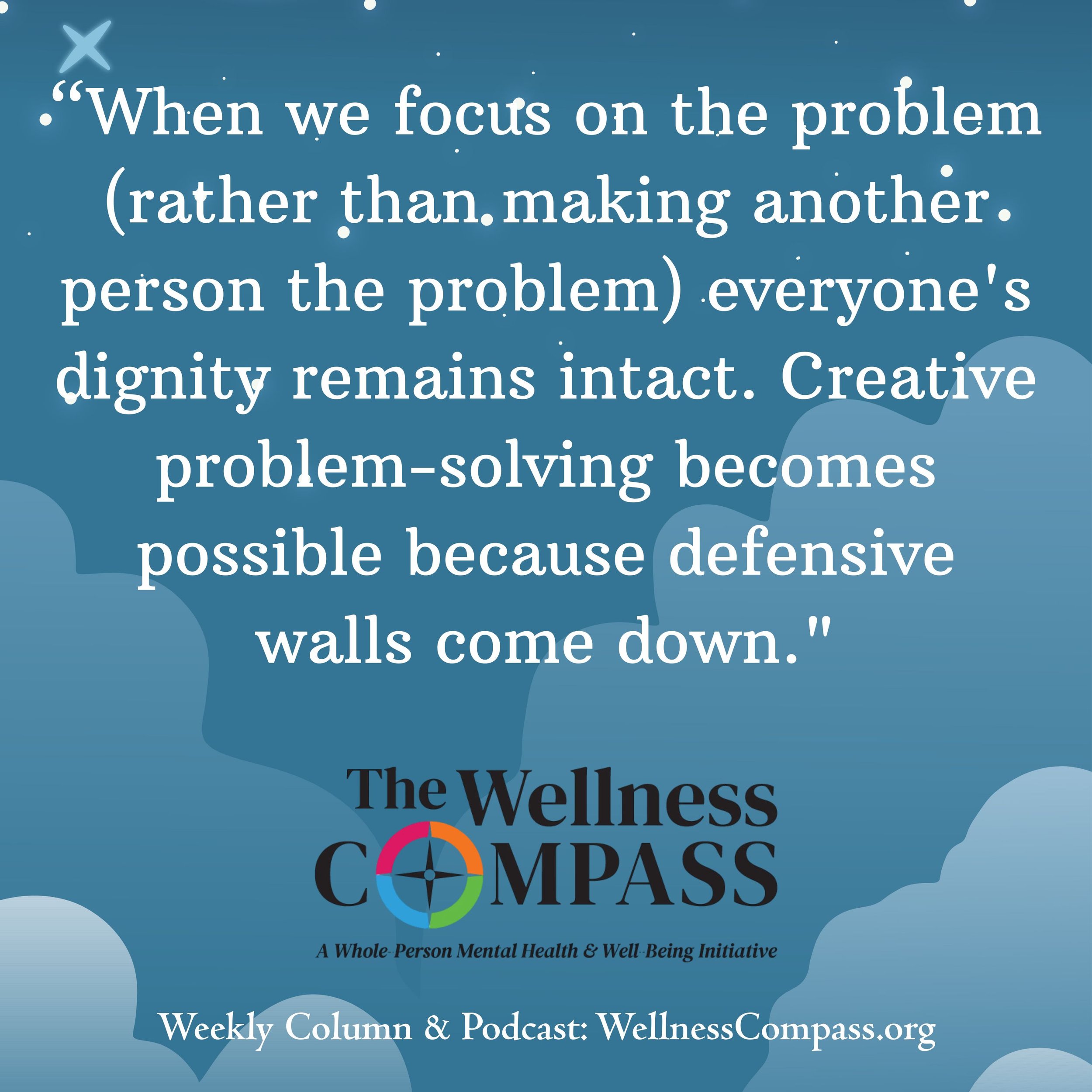Making the Problem the Problem, Not the Person
The Wellness Compass Initiative is our partner community wellness initative that serves schools, counseling centers, nonprofits, universities, and other community wellness organizations. Each week Holly Hughes Stoner and Scott Stoner, who are both licensed marriage and family therapists, co- write a column for Wellness Compass and we are pleased to share it here on our Living Compass site. There is also a Wellness Compass podcast, where Scott and Holly elaborate on the topic of this column each week, at www.wellnesscompass.org/podcast. or in any podcast app (Apple, Google, Spotify, etc).
We've all been there: a conflict starts small—maybe it's about whose turn it is to handle the dishes or a disagreement about something important you're planning together—and suddenly you're no longer discussing the actual issue. Instead, you're blaming each other for being difficult or stubborn. The conversation has shifted from the problem itself to attacking the other person. This only leads to hurt feelings and damaged relationships, with little progress on actually resolving the challenge at hand.
Here are four "compass points" to help us all work together on challenges we are facing, rather than turning against each other.
The problem is separate from the people working on it.
When we're frustrated or stressed, it's natural to want someone to blame. Our partner didn't take out the trash again, so we label them "irresponsible." Our friend is never as punctual as we are, so we label them as "uncaring" or "absent-minded." The moment we make this shift, we've stopped being companions working toward a solution and have become opponents in a battle neither of us can win.
Focusing on the problem creates constructive solutions; blaming people creates defensiveness.
When someone feels attacked, their brain goes into protection mode—they're no longer thinking about solving the issue; they're thinking about defending themselves or counterattacking.
Consider a group of volunteers planning an event for a nonprofit. Half want a large event with a big budget, while the other half want something smaller and less expensive. They can frame this two ways: "Those people are spendthrifts who don't care about our finances" versus "Those people are tightwads too afraid to take risks." Or they could say: "The problem is that we haven't yet come up with a plan that has buy-in from all of us. Let's keep talking and find a recommendation that honors what each of us values.”
Empathy helps us remember that a person's identity is separate from their thoughts and behaviors.
Well-intentioned people often disagree. That doesn't make one person "good" and the other "bad." When we remember this, everyone's dignity remains intact—no one is being labeled or attacked. This means creative problem-solving becomes possible because defensive walls come down, and relationships strengthen because you're reminded you're on the same side.
Sometimes behavior needs to be directly addressed—but still without making the person the problem.
If someone close to us has a drinking problem, for instance, we need to address that behavior directly. But we have a choice in how we approach it. Attacking them and labeling them as an alcoholic is unlikely to help. More effective would be: "We've talked many times about the impact alcohol is having on our life together, and each time it leads to a blowup. I don't like how angry we both get. How about we go together to talk to a professional to help us find a way forward?" Here, the problem is the alcohol and the conflict it creates in their life, not the person.
Making it Personal:
1. Are you stuck in a conflict cycle where you or others are attacking and defending rather than collaborating? How might you shift the focus back to the problem?
2. How does it feel when someone makes you the problem rather than addressing the issue? How might this awareness change your approach?
3. The next time conflict arises, commit to keeping the focus on the problem—not on labeling people.
Subscribe Now to Weekly Words of Wellness:
Click the button below to signup for the e-mail version of Weekly Words of Wellness. This weekly article can be shared with your community electronically and/or used for group discussion.
You can unsubscribe at any time.

